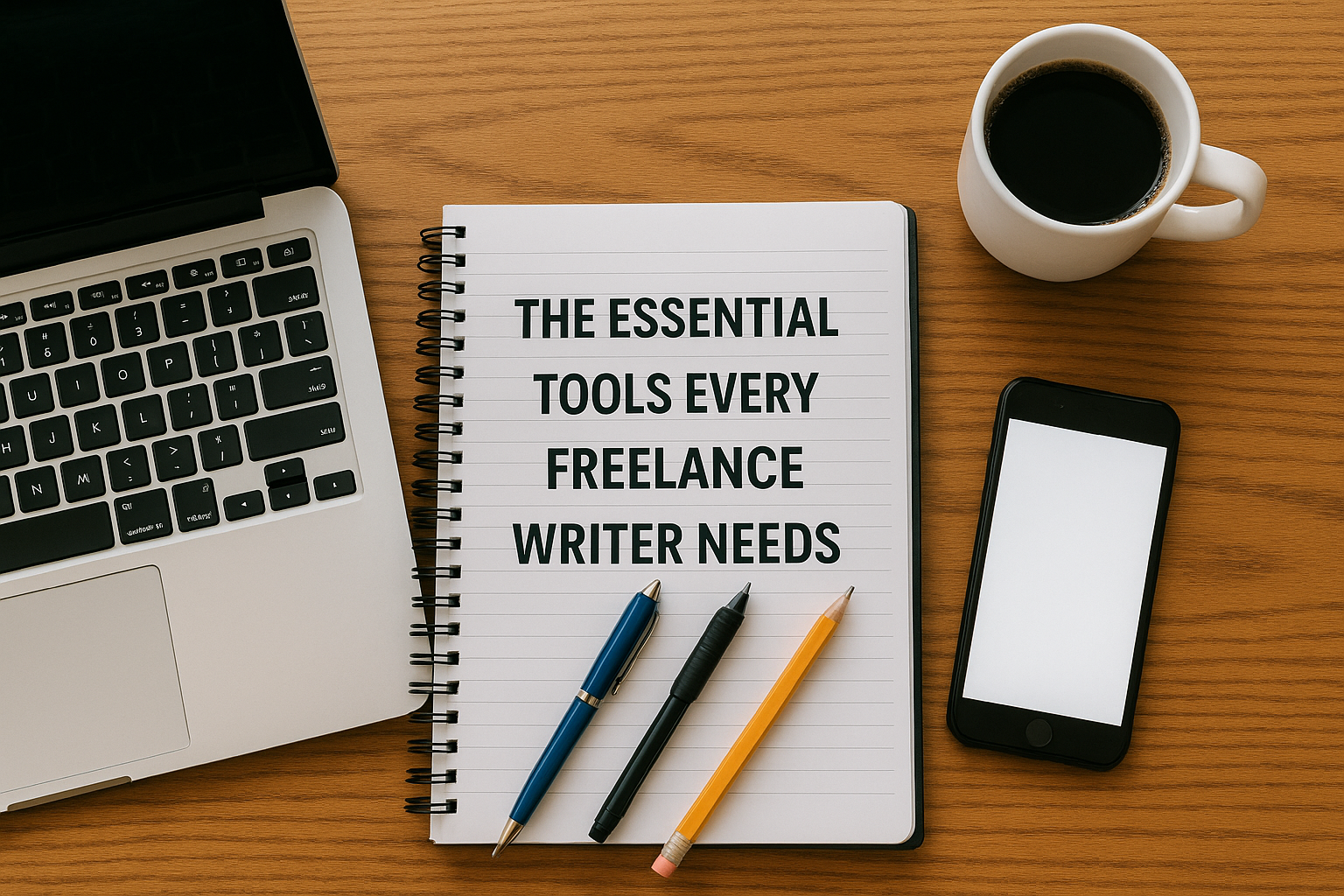Freelance writing success isn’t only about talent. It’s also about having the right tools to work efficiently, stay organized, and deliver top-quality content.
The right setup can save hours, reduce stress, and help you impress clients. Without it, you risk wasting time on avoidable problems.
In 2025, the freelance writing world is more competitive than ever. Writers who use the right tools have a clear advantage.
Writing and Editing Software
A reliable writing program is non-negotiable. Microsoft Word and Google Docs remain industry standards for client compatibility.
Google Docs is especially valuable for real-time collaboration and cloud storage. Word offers powerful formatting and offline access.
For editing, Grammarly and ProWritingAid help catch grammar mistakes, awkward phrasing, and typos. These tools improve accuracy and clarity before you submit work.
Hemingway Editor is great for simplifying sentences and making content more readable. It highlights complex words and passive voice.
Project Management Tools
Freelancers often juggle multiple clients and deadlines. Without organization, things can quickly fall apart.
Trello, Asana, and ClickUp are popular choices for tracking projects. They let you create boards, assign tasks, and set deadlines.
These platforms help you see exactly what needs to be done and when, reducing last-minute stress.
Time Tracking and Productivity Apps
Knowing where your time goes helps you improve efficiency. Time-tracking tools like Toggl or Clockify record hours for each project.
This is especially important if you bill clients by the hour or want to analyze your workflow.
Productivity apps like Focus Booster or Forest use the Pomodoro method to keep you working in short, focused bursts.
Communication Platforms
Clear communication keeps projects running smoothly. Email is standard, but many clients prefer faster channels.
Slack, Microsoft Teams, and Zoom are widely used for quick updates and meetings. They make remote collaboration easier and more personal.
Having multiple communication options makes you more flexible and client-friendly.
Research Tools
Accurate research separates professional writing from sloppy work. Google Scholar, Statista, and industry-specific databases provide reliable information.
BuzzSumo is excellent for finding trending topics and analyzing what content performs best.
For SEO-focused writing, tools like Ahrefs and SEMrush reveal keyword data and competitive insights.
Cloud Storage Solutions
Losing work to a computer crash can be devastating. Cloud storage keeps your files safe and accessible from anywhere.
Google Drive, Dropbox, and OneDrive are secure, easy-to-use options. They also make sharing documents with clients simple.
Organizing your files in the cloud ensures you never lose an important draft.
Invoicing and Accounting Software
Getting paid on time is crucial for freelancers. Invoicing tools like FreshBooks, Wave, or PayPal simplify billing and payment tracking.
These platforms generate professional invoices, send reminders, and record transactions for tax purposes.
Good accounting software also helps you plan for taxes and track business expenses.
Design and Visual Tools
Many writing projects benefit from visuals. Canva is a versatile design tool for creating images, infographics, and social media graphics.
For more advanced needs, Adobe Creative Cloud offers Photoshop and Illustrator.
Even simple visuals can make your content more engaging and client-ready.
Distraction Blockers
Freelancers work online, where distractions are endless. Tools like Freedom or Cold Turkey block time-wasting websites during work hours.
This helps maintain focus and productivity, especially when deadlines are close.
Backup and Security
Cybersecurity is a growing concern for freelancers. Use antivirus software like Bitdefender or Norton to protect your devices.
Regular backups — both cloud-based and physical — ensure you can recover work quickly if needed.
Password managers like LastPass or 1Password keep your accounts safe and easy to access.
Ergonomic Equipment
Your health affects your writing quality. An ergonomic chair, proper desk height, and good lighting prevent strain and fatigue.
Consider a keyboard and mouse designed for comfort, especially if you write for long hours.
These small investments protect your health and improve long-term productivity.
Staying Updated with Trends
In freelancing, tools evolve constantly. Subscribe to industry newsletters, join writing communities, and test new platforms regularly.
Staying current ensures you always have the best resources at your disposal.
Creating a Personalized Toolkit
Every writer’s needs are different. Start with essential tools, then adjust based on your niche and workflow.
For example, a content marketer may prioritize SEO tools, while a technical writer may need advanced research databases.
A tailored toolkit keeps you efficient and competitive.
Building Habits Around Tools
Having the right tools is just the start. You need to use them consistently and effectively.
Integrate them into daily routines so they become second nature.
This way, you maximize their benefits and keep your workflow smooth.
Long-Term Benefits of the Right Tools
Writers who invest in the right tools save time, deliver better work, and attract higher-paying clients.
They can take on more projects without feeling overwhelmed, building sustainable careers.
The right tools turn talent into a professional, reliable business.
Equipping Yourself for Success
Freelance writing is part creativity, part business. Tools bridge that gap, allowing you to focus on what you do best — writing.
By building a solid toolkit and mastering it, you position yourself as a professional clients can trust.
With the right setup, every project becomes smoother, faster, and more rewarding.



